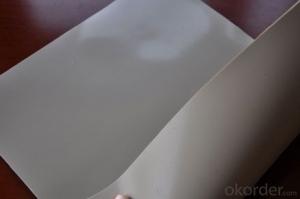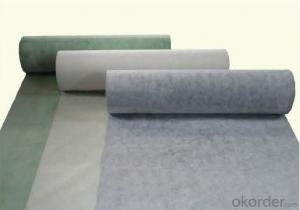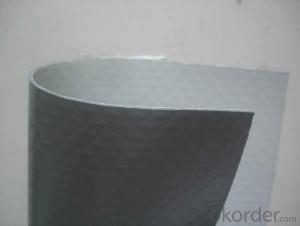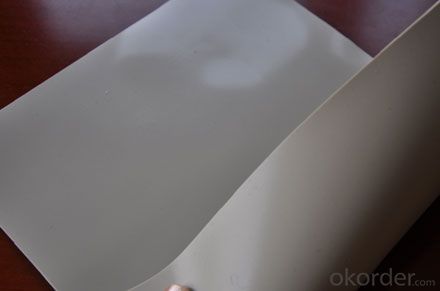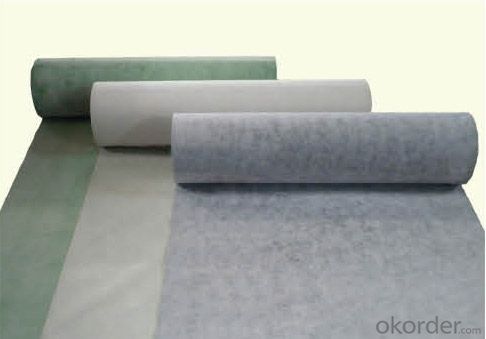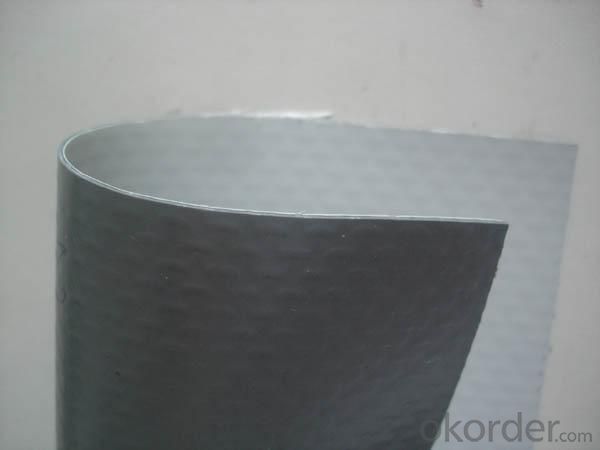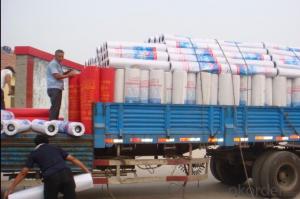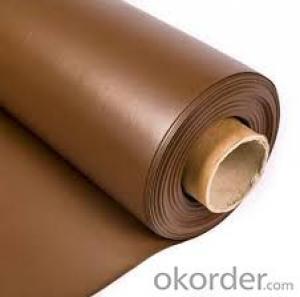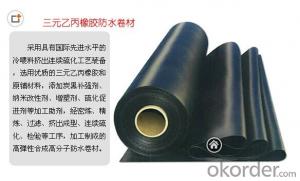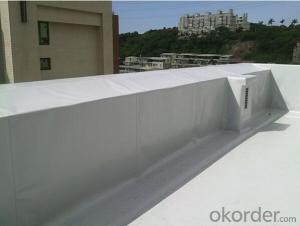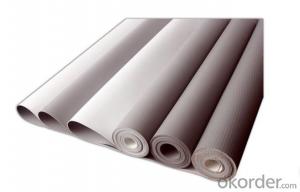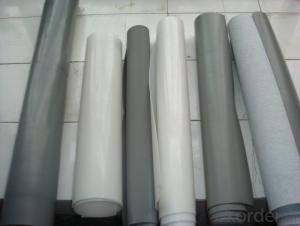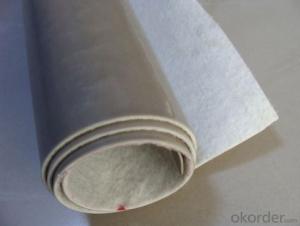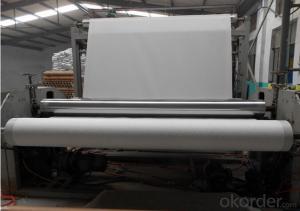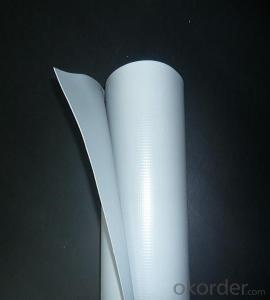Polyvinyl Chloride Plastic Waterproof Membrane
- Loading Port:
- China main port
- Payment Terms:
- TT OR LC
- Min Order Qty:
- 5000 m²
- Supply Capability:
- 100000 m²/month
OKorder Service Pledge
OKorder Financial Service
You Might Also Like
Specification of PVC Waterproofing Membrane
Length | 20m/roll or customized |
Width | 2.05m |
Thickness | 1.2mm; 1.5mm; 2.0mm |
Type | Homogeneous, Reinforced, Fabric back |
If Exposed | Exposed and Non-exposed |
Color | White, Grey or customized |
Introduction of PVC Waterproofing Membrane
Polyvinyl chloride the pvc waterproofing plastic membrane is a kind of excellent performance of polymer waterproof material,PVC resin as the main raw material,add all kinds of special additive and anti-aging composition,the use of advanced equipment and advanced technology extrusion rolling is made.The product has the tensile strength and elongation high shrinkage of small,low temperature soft good,long life and other advantages, the products wide 1.2m to 3.0m, the thickness of 0.8-2.0 mm(special specifications can be customized),stable performance,reliable quality,construction is convenient.
Application Scope
The products are widely used in all kinds of civil construction,subway,tunnel,water conservancy,landfill site,chemical industry,metallurgy and other areas of waterproof seepage control,corrosion engineering.
Product Category
Single composite PVC waterproof materials
Double composite PVC waterproof board
Seperate PVC waterproof board
Some sticky type PVC waterproof materials
FAQ of PVC Waterproofing Membrane
a.Can we get some samples before place order?
Answer: We can send the free samples to you by freight collect.
b.How many years can your PVC membrane guarantee?
Answer: We will guarantee the quality for 5 years at least.
c.Which countries you ever export the product?
Answer: We export the PVC membrane to South Africa, Middle east and even European countries.
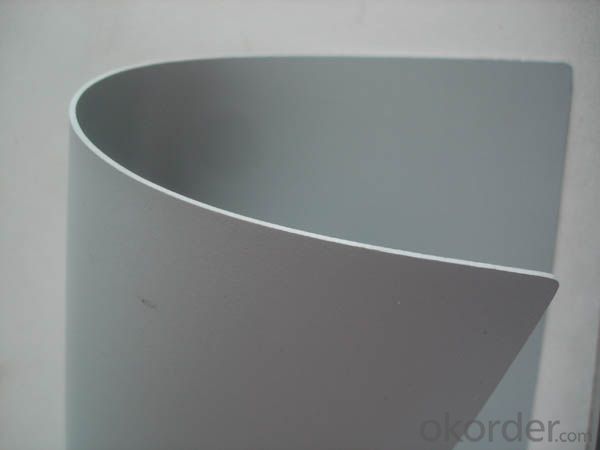
- Q: Can a waterproofing membrane be used for swimming pools or water features?
- Swimming pools and water features can benefit from the use of a waterproofing membrane. This membrane is designed to create a barrier that prevents water from causing damage by seeping through. It is commonly used in various applications, such as swimming pools and water features, to keep the water contained within its designated area. When choosing a waterproofing membrane for these purposes, it is important to select one that is specially formulated to withstand the constant exposure to water, chemicals, and other elements commonly found in these environments. Proper installation is crucial to ensure the effectiveness and longevity of the membrane. To determine the most suitable waterproofing membrane for your specific project, it is recommended to seek professional advice.
- Q: Can a waterproofing membrane be used on concrete surfaces?
- Concrete surfaces can indeed benefit from the application of a waterproofing membrane. These membranes are frequently employed to safeguard concrete constructions, such as basements, foundations, and roofs, against water-related harm. Their purpose is to establish a barrier that prevents water from infiltrating the concrete surface. By doing so, they aid in averting the accumulation of moisture, the growth of mold, and the deterioration of the concrete. Furthermore, these waterproofing membranes can furnish supplementary defense against chemicals, UV rays, and other environmental elements. To accomplish the desired waterproofing outcomes, it is crucial to ensure that the membrane is properly installed and compatible with the specific concrete surface.
- Q: Can a waterproofing membrane be used on tunnels with historical significance?
- Yes, a waterproofing membrane can be used on tunnels with historical significance. The use of a waterproofing membrane is a common method to prevent water infiltration and damage in tunnels, regardless of their historical significance. It is crucial to protect these tunnels from water damage, as moisture can lead to deterioration, structural issues, and even collapse over time. However, when working with tunnels of historical significance, it is important to take additional precautions to preserve their historical integrity. This may involve using a waterproofing membrane that is visually compatible with the tunnel's original materials, ensuring that the installation does not disrupt or damage any historical features, and obtaining the necessary permissions, permits, and approvals from relevant historical preservation authorities. By following these guidelines, it is possible to effectively waterproof tunnels with historical significance while also preserving their historical and cultural value.
- Q: Can a waterproofing membrane be used for seawalls or bulkheads?
- Yes, a waterproofing membrane can be used for seawalls or bulkheads. These membranes are designed to provide a barrier against water penetration and can effectively protect structures from the corrosive effects of saltwater and wave action. This makes them suitable for use in constructing and maintaining seawalls and bulkheads, ensuring their durability and longevity.
- Q: Can a waterproofing membrane be used for a commercial building roof?
- Yes, a waterproofing membrane can be used for a commercial building roof. Waterproofing membranes are commonly used in commercial roofing systems to provide a durable and effective barrier against water penetration. These membranes are designed to withstand the challenges of commercial buildings, such as exposure to the elements, foot traffic, and mechanical equipment. They offer excellent protection against leaks, moisture damage, and other potential roofing issues, making them a suitable choice for commercial applications.
- Q: How does a waterproofing membrane withstand freeze-thaw cycles?
- A waterproofing membrane is designed to withstand freeze-thaw cycles by being made of materials that are resistant to temperature changes and water infiltration. These membranes are typically composed of durable polymers such as polyurethane, polyethylene, or PVC, which have low permeability to water and can resist the expansion and contraction caused by freezing and thawing. During freeze-thaw cycles, water can enter small cracks and pores in a structure. When this water freezes, it expands, exerting pressure on the surrounding materials. This expansion can cause cracks to widen and weaken the structure, leading to water leakage and potential damage. However, a waterproofing membrane acts as a barrier, preventing water from penetrating the structure and reducing the potential for freeze-thaw damage. The membrane is installed on the exterior surface of the structure, forming a seamless and continuous layer that does not allow water to pass through. It adheres tightly to the surface and is flexible enough to accommodate the dimensional changes caused by temperature variations. Moreover, waterproofing membranes are often reinforced with other materials such as fabrics or meshes to enhance their strength and stability. These reinforcements further protect the membrane from damage during freeze-thaw cycles, ensuring its long-term effectiveness. In summary, a waterproofing membrane withstands freeze-thaw cycles by preventing water infiltration and resisting the expansion and contraction caused by freezing and thawing. Its composition, including durable polymers and reinforcements, makes it a reliable barrier against water penetration, reducing the risk of structural damage and maintaining the integrity of the protected surface.
- Q: Are waterproofing membranes resistant to mineral oils?
- Waterproofing membranes can vary in their resistance to mineral oils. Some waterproofing membranes are specifically designed to be resistant to mineral oils, while others may not be. It is important to check the specifications and product information provided by the manufacturer to determine the resistance of a particular waterproofing membrane to mineral oils. Additionally, it is recommended to consult with a professional or the manufacturer directly for specific guidance on the compatibility of a waterproofing membrane with mineral oils in your specific application.
- Q: Does a waterproofing membrane require any specific surface preparation for tile installations?
- Yes, a waterproofing membrane typically requires specific surface preparation for tile installations. The surface needs to be clean, dry, and free of any dirt, dust, or debris. It is important to remove any loose or damaged tiles, repair any cracks or imperfections, and ensure the surface is smooth and level before applying the waterproofing membrane. This preparation ensures proper adhesion and a successful tile installation.
- Q: Can a waterproofing membrane be used in interior or exterior applications?
- Yes, a waterproofing membrane can be used in both interior and exterior applications. In interior applications, such as basements or bathrooms, a waterproofing membrane can be installed on walls or floors to prevent water or moisture from seeping through. This helps to protect the underlying structure from damage caused by water intrusion. In exterior applications, a waterproofing membrane can be applied to the exterior walls or foundations of a building to prevent water from penetrating into the structure. This is especially important in regions with heavy rainfall or high water tables. By creating a barrier against water, the membrane helps to keep the interior of the building dry and free from water damage. Overall, the use of a waterproofing membrane in both interior and exterior applications is essential for ensuring the longevity and durability of a structure by protecting it from water-related issues.
- Q: Can a waterproofing membrane be used for swimming pool coping?
- No, a waterproofing membrane is not typically used for swimming pool coping. Coping refers to the materials used to cap the edge of a swimming pool, such as tiles or stones. While a waterproofing membrane may be used to seal and protect the pool shell, it is not designed to serve as a coping material.
Send your message to us
Polyvinyl Chloride Plastic Waterproof Membrane
- Loading Port:
- China main port
- Payment Terms:
- TT OR LC
- Min Order Qty:
- 5000 m²
- Supply Capability:
- 100000 m²/month
OKorder Service Pledge
OKorder Financial Service
Similar products
Hot products
Hot Searches
Related keywords
